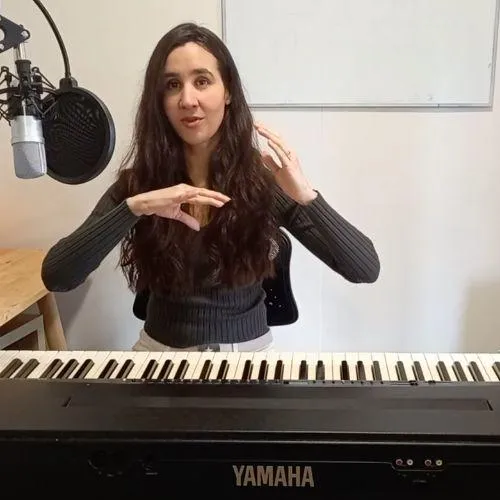Contemporary Vocal Training From a Functional Approach
Learn to sing online and in person (Auckland, NZ) with a certified vocal coach

Yes, you can learn to sing!
We offer singing lessons for all levels, vocal training and artistic coaching in Auckland and online - kids (9+ years old), teens and adults welcome.
Lessons available for all levels

Auckland singing lessons
Learn to sing one on one in Auckland with a certified vocal coach. Jorgelina uses her own method, which includes elements of holistic vocal methods and also the north american vocal techniques used by the stars 🤩. Lessons are available for adults (all levels including complete beginner) and for kids and teens who are working on GRADE 4 (Rockschool Syllabus) or above.
Right now we don't have a class available for beginners (they will be back in the future!)

Online vocal training
Jorgelina offers onlilne one on one vocal coaching programs as well as casual sessions. Learn from wherever you are!
Improve your voice...
Improve your communication...
Improve your life!
ANYONE can learn to sing like a pro!
There is no mistery anymore. Nowadays we know VOCAL SCIENCE. You just have to get the right guide!
Getting your dream voice is your choice!
At Auckland Contemporary Singing School, you will be guided with the right tools for you to progress towards the voice of your dreams. If you practice your tools, you'll be unstoppable!
Some feedback from past students!
Frankie Lam

Highly recommended; Jorgelina, the primary singing instructor knows her stuff and really helped guide me through finding my mixed voice.
She has huge amounts of knowledge on the science and theory behind singing and approaches lessons in a very structured but still personalised manner. Very happy with my decision to take lessons here.
Jess Reeve - Taylor

I really struggled with the high notes before coming to Jorgelina! She's coached me through so many techniques and although there is so much to learn I feel like I've seen lots of progress already. My confidence has grown massively since joining the group classes too and she encourages performing at every opportunity. I love that Jorgelina takes a holistic approach to singing and understands that it's not just about sounding great, the voice also has strong connections to the body and mind. Thanks Jorgelina!
Rupert Wilson

Bruh. Jorgelina is an awesome singing teacher! Super knowledgable, very engaged and 100% passionate. She's helped me a lot. Her methods and techniques feel organic and natural. She moves at your pace and is super supportive about you achieving your singing goals. Would recommend her to anyone with a vagus nerve (thats everyone btw!).
Get In Touch
Email: [email protected]
Our vocal training can be done 100% online (adults only) or in person in Auckland, NZ (North Shore area)
Learn to sing with us!
© 2024 Auckland Contemporary Singing School - All Rights Reserved

Facebook
Instagram
Youtube